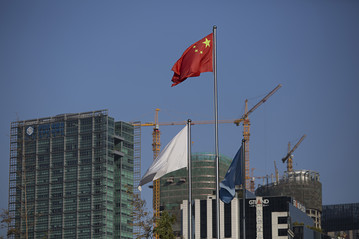Home -> News -> Media -> ‘Bold’ Chinese Stimulus Eased Recession Pain, Fed Economists Say
‘Bold’ Chinese Stimulus Eased Recession Pain, Fed Economists Say

China avoided prolonged economic pain during and after the recession because, unlike the U.S., its government enacted a “bold and powerful” stimulus package, two researchers argue in a new paper from the Federal Reserve Bank of St. Louis.
“We believe that the inability to implement aggressive and decisive fiscal policies in Western countries explains the stubborn persistence of the Great Recession and jobless recoveries in the United States and Europe, in contrast to the recent rapid economic recovery in China and the Great Recovery in the United States (in the 1930s-40s) following the Great Depression,” wrote Yi Wen and Jing Wu in a working paper.
In 2008 and 2009, as the global financial crisis and recession took shape, many public officials embraced the Great Depression-era view of economist John Maynard Keynes that increased government spending should act as a counterbalance during downturns to stimulate the economy.
In the U.S., for example, the federal government enacted fiscal stimulus in the form of tax cuts in 2008 and the 2009 American Recovery and Reinvestment Act. Meanwhile, the Federal Reserve provided monetary stimulus by lowering interest rates nearly to zero in late 2008 and beginning large-scale bond purchases, or quantitative easing, to lower long-term borrowing costs.
Still, the U.S. economy’s has recovered slowly and unemployment remains stubbornly high. But in China, despite exports cratering during the recession, economic growth “rebounded to its double-digit pre-crisis rate” by late 2009, wrote Mr. Wen, an assistant vice president at the St. Louis Fed, and Mr. Wu, a researcher at Tsinghua University in Beijing.
The key difference, they wrote, is that China “implemented bold, decisive fiscal stimulus programs that no other major nations dared to adopt. In particular, the Chinese government cleverly used its state-owned enterprises (SOEs) as a fiscal instrument to implement its aggressive stimulus program in 2009, consistent with the very Keynesian notion of aggregate demand management through increased government spending and the fiscal multiplier principle.”
Messrs. Wen and Wu contrasted China’s mostly fiscal stimulus to efforts in the U.S. and Europe they described as “almost purely monetary.” They dismissed the U.S. government’s 2008 tax cuts and 2009 stimulus package as “effectively very small, in sharp contrast to its monetary stimulus packages.” They also suggested that “fiscal stimulus programs that rely heavily on tax reliefs and transfer payments to households,” as did the 2008 and 2009 U.S. efforts, “are not as effective as direct increases in government spending on goods and services.”
The “jobless recoveries” in the U.S. and Europe, they concluded, “are attributable to market-coordination failures and the inability of their governments to implement aggressive expansionary fiscal policies,” and “monetary policies alone are insufficient to end the Great Recession.”
Messrs. Wen and Wu aren’t alone in criticizing U.S. fiscal policy as insufficiently aggressive in recent years. The economist Paul Krugman argued in 2009 (and many times since) that the federal government’s stimulus package was too small. Former Fed Chairman Ben Bernanke has more recently described fiscal policy as a drag on the economic recovery. “On the whole — except for in 2009 — we had very tight fiscal policy” that has proven “contractionary,” Mr. Bernanke said at his final press conference in December.
- .U.S. Treasury looks to hold more cash to deal with future crises
- .Yum, McDonald's in Shanghai food safety investigation
- .Yellen defends loose Fed policy, says job market still too weak
- .Carl Icahn says 'time to be cautious' on U.S. stocks
- .Samsung Electronics says second quarter profit likely down 24.5 percent; worst in two years
- .U.S. jobs data seen reinforcing strong growth outlook
- .Asia stocks up on buoyant Wall Street, oil near highs

